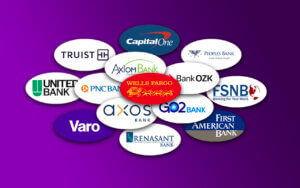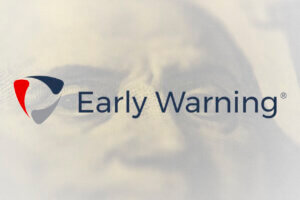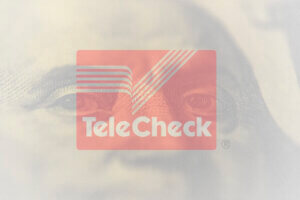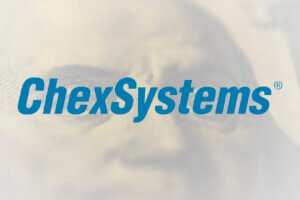What is ChexSystems?
ChexSystems is a consumer reporting agency in the United States specializing in tracking information about savings and checking account history.
It gathers data on overdrafts, bounced checks, account closures, suspected fraud, and account applications from your closed bank accounts. The collected data is kept in the records for up to five years.
What is the purpose of ChexSystems?
They primarily assist clients in assessing the risk of opening new accounts. By analyzing an individual’s ChexSystems report, banks and credit unions evaluate their banking history and determine whether they are likely to be responsible account holders.
Unlike credit bureaus that track an individual’s credit history, ChexSystems focuses exclusively on banking history. It does not report on credit cards, loans, or other credit accounts.
How Does ChexSystems Work?
Here’s a breakdown of how ChexSystems works:
- Information Collection: ChexSystems collects data from various sources, including banks, credit unions, and other institutions.
- Data Processing: ChexSystems processes the collected information to create accurate and up-to-date consumer profiles.
- Report Generation: ChexSystems generates reports based on consumer profiles, providing financial institutions with insights into banking history and risk assessment.
- Account Opening Decisions: Financial institutions use ChexSystems reports to make informed decisions about opening new accounts for consumers.
- Consumer Access: Consumers can access and review their ChexSystems reports to ensure accuracy and dispute any inconsistencies.
Where Does ChexSystems Get Its Information?
ChexSystems gathers information about checking and savings accounts from a variety of sources, including:
- Banks and credit unions: Banks and credit unions are the primary source of information for ChexSystems. They contribute information about new account openings, account closures, overdrafts, ATM abuse, bounced checks, and other banking activities.
>> Read up on Banks vs.Credit Unions: In-depth Comparison - Consumers: Consumers can also submit information to ChexSystems, such as disputes about inaccurate information or requests to remove information that is no longer relevant.
- Data Purchase: ChexSystems also acquires data from other sources, such as check-cashing services and third-party data providers. This additional data helps ChexSystems maintain a comprehensive record of an individual’s banking history.
ChexSystems functions in compliance with the Fair Credit Reporting Act (FCRA), protecting consumer privacy and ensuring the accuracy of collected data. Consumers have the right to dispute any errors in their ChexSystems report.
What Are ChexSystems Scores?
ChexSystems Consumer Scores are numerical representations of an individual’s financial history and banking behavior, primarily related to checking and savings accounts.
ChexSystem scores range from 100 to 899. They are determined based on information in your consumer file, but the exact factors influencing them are not publicly disclosed.
Unlike traditional credit scores, ChexSystems does not reveal its scoring criteria. ChexSystems also uses multiple scoring models for their scores.
Why do financial institutions use this score?
Potential lenders or other companies utilize ChexSystems scores to assess an individual’s past creditworthiness and determine the financial risk associated with approving their application for a new account.
Does every bank use the same ChexSystems scoring model?
Financial institutions may use different ChexSystems scoring models and weigh the scores differently. Therefore, the ChexSystems score provided to one institution may differ from the score provided to another.
Additionally, ChexSystems scores can change over a period of time as information in an individual’s consumer report is updated.
What Information Is Used When Generating ChexSystems Scores?
The specific factors that influence ChexSystems scores are not publicly disclosed. However, informed estimates can be made based on the information known to be included in ChexSystems reports.
Factors that are likely to harm your ChexSystems scores include:
- Account openings and closures: Frequency of checking and savings account openings and closures
- Overdrafts: It occurs when spending exceeds available funds in a bank account, leading to a negative bank account balance
- Bounced checks: Checks that fail to process due to insufficient funds.
- Unpaid fees: Charges for services or violations of account terms. Examples include ATM and overdraft fees.
- Negative balances: Checking or savings account balance falls below zero due to overdrafts or automatic debit charges.
- Delinquency: Failure to make timely payments on any type of debt, including credit cards, loans, utilities, or rent.
- Fraudulent activity: Reported instances of bank fraud or account misuse, including suspected fraud or identity theft
The ChexSystems score is not based on personal information such as race, ethnicity, marital status, religion, age, sex, sexual orientation, gender identity, or criminal history.
How Can I Manage or Improve My ChexSystems Score?
Your ChexSystems score can gradually improve over time as your overall financial behavior demonstrates responsible credit and debit usage, but there are ways to improve it.
- Address any negative account balances promptly to prevent charge-offs, which may occur after 45-60 consecutive days of negative balance.
- Practice responsible banking habits by managing your credit and debit activities effectively.
- Avoid applying for too many checking accounts in a short period, as this can negatively impact your score.
Note: Paying off a charged-off account does not remove it from your consumer report. The information source, such as banks or collection agencies, must update the report with the payment status and date. While the report reflects the updated status, the record remains on file for five years.
Cautionary advice: Approach credit repair companies with caution. Avoid those who promise to remove accurate information from your credit history, as it is illegal for them to do so.
What Is a ChexSystems Report?
Your ChexSystems consumer report, also known as your ChexSystems consumer file, tracks information about your checking and savings accounts. Banks and credit unions use this report to assess your risk of opening a new account. Negative ChexSystems entries can act as a barrier to obtaining new bank accounts, loans, and credit cards.
How do I see my ChexSystems report?
You can obtain your ChexSystems report for free by ordering it directly from ChexSystems. You are entitled to one free copy of your consumer disclosure report every 12 months under the Fair Credit Reporting Act (FCRA).
ChexSystems provides all consumer disclosure reports and consumer score reports free of charge. Requesting your own consumer reports does not affect your credit scores.
To order your ChexSystems report, follow these simple steps:
- Visit the ChexSystems consumer portal (chexsystems.com) and create an account or log in.
- Select “Order Your Report” and choose the “Consumer Disclosure Report.”
- Enter your full name, current address, date of birth, and Social Security number.
- Carefully review and submit your request form.
ChexSystems will process your request and send you your consumer disclosure report within five business days.
Do ChexSystems Reports Affect Credit Scores?
ChexSystems report does not directly affect your credit score. Credit scores are calculated from the data from your credit report based on your credit history. In contrast, a ChexSystems consumer file focuses on your banking history, particularly your closed checking and savings accounts.
However, your ChexSystems report can indirectly affect your credit score.
Negative ChexSystems records can restrict access to traditional banking, which often drives people towards pricey alternatives like prepaid cards or check cashing. The recurring fees strain budgets, increasing the risk of late payments and credit score damage.
Additionally, if an unpaid negative balance on your checking account is sent to a debt collection agency, they might report it to the national credit bureaus. Such a report could negatively impact your credit score.
Low credit scores introduce additional friction in financial decisions since they make accessing loans harder and financing cars with subpar credit challenging, among other things.
>> Learn more: How To (Easily) Improve Your Credit Score
What Kind of Information Does ChexSystems Collect?
A ChexSystems consumer file contains information related to your checking and savings accounts, specifically:
- Account openings and closings
- Overdrafts and bounced check
- Unpaid fees
- Fraudulent activity
- Collection items
- Account alerts
What type of information is not included in my consumer file?
Your ChexSystems report contains information relevant to creditworthiness and financial responsibility. It excludes personal details like your marital status, education level, criminal records, employment history, and credit bureau score.
Additionally, it does not include information about open or active accounts, rental history, or voluntarily closed accounts with no history of mishandling.
ChexSystems Reports vs Credit Bureau Reports: What’s the difference?
The three major national credit bureaus – Experian, Equifax, and TransUnion – generate the most widely used credit bureau reports. Let’s see how these are different from the ChexSystems reports.
Three key differences:
1. ChexSystems reports focus on checking and savings account history, including overdrafts, unpaid banking fees, and closed accounts. Credit bureau reports center on credit history, including loans, credit cards, and late payments.
2. ChexSystems reports are predominantly used by banks and credit unions, whereas credit bureau reports have a broader application, including mortgage and auto lenders.
3. ChexSystems reports do not directly impact credit scores, while credit bureau reports directly impact credit scores since credit scores are calculated using credit bureau report data.
Negative ChexSystems Report: What Can You Do?
If you’ve reviewed your ChexSystems report and discovered negative entries hindering your banking activities, you may question how to get out of the ChexSystems system. Below are some effective strategies.
Steps to take when you have a negative ChexSystems report
- Obtain and Dispute: Order your ChexSystems report and carefully review it for any errors or identity thefts. If identified, dispute them with ChexSystems. More on this later.
- Address Debts: Identify outstanding debts and unpaid balances contributing to your negative report. Prioritize and negotiate repayment plans with creditors.
- Maintain Positive Banking Habits: Avoid overdrafts, pay fees promptly, and maintain consistent account activity to demonstrate responsible banking practices.
- Consider Alternative Banking Options: Explore second-chance accounts or non-ChexSystems banks to reestablish a positive banking history.
- Seek Professional Guidance: Consult credit counselors or financial advisors for personalized advice and strategies to improve your financial health.
>> Read up on our detailed guide: How to Clear Up Your ChexSystems Record
How long do you stay in ChexSystems?
Negative information on your ChexSystems report generally remains on file for five years. However, there may be exceptions in certain situations, such as when the source of data (banks and lenders) requests its removal, or ChexSystems is legally obligated to do so.
Does paying off a debt remove negative information from ChexSystems report?
Settling debts will not remove the negative information from your ChexSystems report. The source of the information (banks and credit unions) is not obligated to remove the record, but they must update it to reflect the “paid in full” status and date. ChexSystems will update their records accordingly.
Preventing Negative Listings: What steps can you take to avoid negative entries in ChexSystems?
- Manage banking responsibly (avoid overdrafts, late payments, monitor balances).
- Resolve financial disputes promptly (contact creditors, provide documentation).
- Communicate effectively with creditors (inform them of financial difficulties).
- Exercise caution with debit card usage (protect card information, avoid risky websites).
- Monitor ChexSystems report periodically (identify and dispute inaccuracies).
How to dispute inaccurate entries in your ChexSystems report?
If you believe there is inaccurate information on your ChexSystems report, you can dispute it online (chexsystems.com/dispute) or by mail. Gather supporting evidence, such as bank statements or payment confirmations.
ChexSystems will investigate your dispute and notify you of their decision within 30 days. If your dispute is successful, the inaccurate information will be removed from your report.
Identity Theft on Your ChexSystems Report? Here’s What to Do
If you suspect identity theft while reviewing your ChexSystems report, take immediate action:
- Add a Security Alert: Place a Consumer Reported Identity Theft Security Alert on your ChexSystems consumer file to notify potential creditors of your suspicion.
Also, consider OnAlert® from ChexSystems®, a suite of services that provides comprehensive identity theft protection, financial education, and consumer monitoring. - Freeze Your ChexSystems Report: Place a security freeze on your ChexSystems consumer report to prevent unauthorized access to your information.
- Report the Identity Theft: As a victim of identity theft, swiftly contact the Federal Trade Commission (FTC) and file a police report to document the identity theft and receive assistance.
Open Bank Account Despite Bad ChexSystems
Even with a negative ChexSystems report, you still have options to access basic banking services. Here are a few alternative approaches to consider:
- Second-Chance Checking Accounts:
Several institutions offer second-chance banking by overlooking negative records, featuring accounts designed for individuals with poor banking history. These accounts often lack standard checking account services like overdraft protection or direct deposit.
>> Read up on the 15 Best Second Chance Bank Accounts
- Non-ChexSystems Banks: Some banks do not utilize ChexSystems to evaluate potential customers. Instead, these banks may use alternative credit reporting agencies or rely more heavily on income verification and personal references.
>> Learn more: 10 Banks That Don’t Use ChexSystems
- Non-ChexSystems Credit Unions: Credit unions are member-owned financial institutions with more lenient policies than traditional banks. Some of them may be more willing to overlook past banking issues if you meet their membership criteria.
>> Read up on 8 Credit Unions That Don’t Use ChexSystems
- Online Banks: Online or Neobanks often have less stringent account opening requirements than brick-and-mortar banks. They may not use ChexSystems at all or may place less weight on negative ChexSystems entries.
- Prepaid Debit Cards: While not technically a regular bank account, prepaid debit cards enable you to manage your finances without a traditional deposit account like a checking or savings account. They can be loaded with funds and used for purchases, cash deposits, and ATM withdrawals.
What Are the Main Consumer Reporting Agencies (CRAs) Other Than ChexSystems?
CRAs help banks and lenders assess creditworthiness for approving deposit accounts, granting loans and credit cards, or accepting checks. Let’s explore the main CRAs in each of these three categories.
CRAs that specialize in checking and savings account history
- ChexSystems collects data on overdrafts, bounced checks, account closures, potential fraud, and account applications, maintaining records for up to five years. It is the most popular of the three.
- Early Warning Services (EWS) provides consumer reports to financial institutions, helping them assess account opening risks. It is the second most used service after ChexSystems.
>> Explore our Early Warning Explained guide to learn more.
- Cross Check provides information about a consumer’s banking history, helping banks and credit unions assess risk, employers make hiring decisions, and landlords make property rental decisions. It is the least popular among the three in the US.
CRAs that specialize in credit history (Consumer Credit Reporting Agencies)
- Equifax collects information about consumers’ credit history, including their payment history, credit utilization, and debt-to-income ratio. Lenders, employers, and landlords use this data to make decisions about loan applications, employment, and housing.
The scoring models used are the FICO Score and VantageScore.
- Experian collects data such as credit history, employment history, and property records. Experian’s information is used by lenders, employers, and insurers to make decisions about creditworthiness, employment, and insurance.
The scoring models used are the Experian Plus Score, FICO Score, and VantageScore.
- TransUnion collects information such as credit history, employment history, and property records. TransUnion’s information is used by lenders, employers, and utility companies to make decisions about creditworthiness, employment, and service activation.
The scoring models used are TransUnion Risk Score, FICO Score, and VantageScore.
CRAs that specialize in check verification
- TeleCheck is a check acceptance company that helps businesses reduce fraud and risk associated with accepting check payments. It does this by providing a real-time check authorization service that verifies the authenticity of a check and the account holder’s information.
>> Read up on TeleCheck: Explained - Certegy Check Services also provides real-time check authorization and verification services. It analyzes check details to identify potential fraud and provides instant accept or decline recommendations.
- Shared Check Authorization Network (SCAN) is a real-time check verification system retailers use to combat bad check fraud. It maintains a comprehensive database of bad check writers and instantly alerts retailers if a check is associated with a known offender, preventing fraudulent payments.







